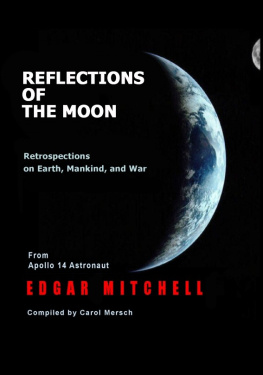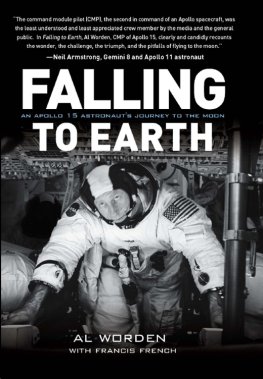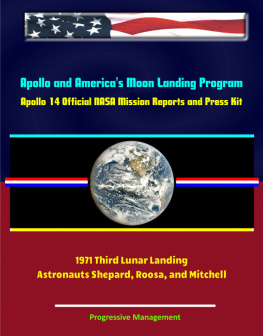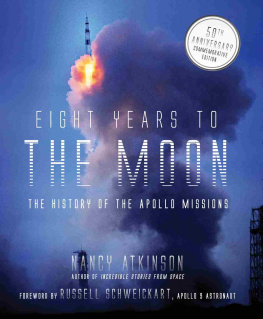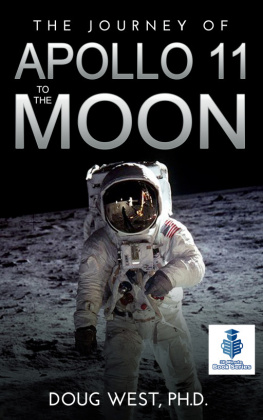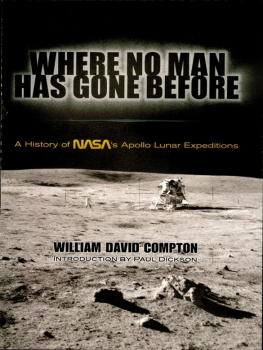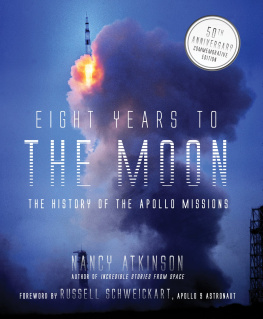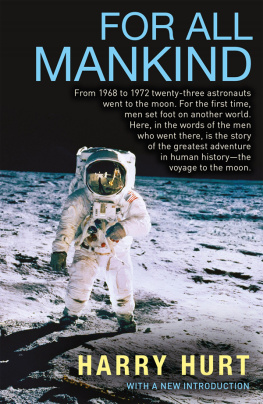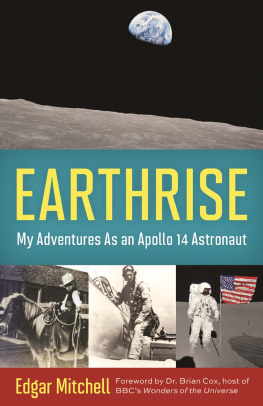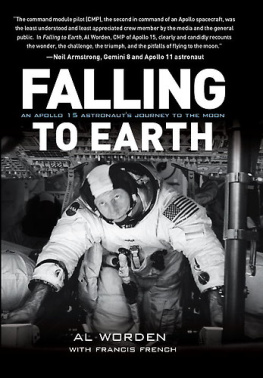REFLECTIONS
OF
THE MOON
Apollo 14 Astronaut
Edgar Mitchell
Retrospections on
Earth, Mankind, and War
Compiled by Carol Mersch
Pen-L Publishing
Fayetteville, Arkansas
www.Pen-L.com
Copyright 2016
Edgar Mitchell and Carol Mersch
All rights reserved
No part of this book may be used or reproduced in anymanner without written permission from the publisher, except in thecontext of reviews.
First ElectronicEdition
ISBN:978-1-68313-019-2
This book was originally published as TheSpace Less Traveled in celebration of the 40th anniversary ofthe Institute of Noetic Sciences (IONS), an organization founded byApollo 14 astronaut Dr. Edgar Mitchell in 1972 to pursue theexploration of consciousness, sustainability, and the inherentpower within each of us to make a difference.
It was dedicated in 2012 to Dr. Mitchellsson, Adam, who died at the age of 25.
It is rededicated here to the man himself whodied February 4, 2016, on the eve of the 45thanniversary of his Apollo 14 moon mission.
In loving memory of Adam Mitchell
1984-2010
and to the lasting legacy of his father,
Apollo 14 astronaut Edgar Mitchell.
1930-2016

Contents
EARTH
MANKIND
SELF
SPIRITUALITY
LOVE
WAR
SUSTAINABILITY
QUANTUMENTANGLEMENT
EXTRATERRESTRIAL
THEUNIVERSE
InClosing
Aboutthe Author
AboutCarol Mersch
Legend ofSources
There is a saying in the world of publiccommunications that if you cant dazzle them with brilliance,baffle them with bullshit. Since I can do neither, I will attemptto be articulate.
Dr. Edgar Mitchell
When Foxes Guard the Hen House

Introduction
On January 31, 1971, Navy Captain Dr. EdgarMitchell embarked on a journey into outer space, resulting in hisbecoming the sixth man to walk on the Moon. The Apollo 14 missionwas NASAs third manned lunar landing. This historic journey endedsafely nine days later on February 9, 1971. It was an audacioustime in the history of mankind. For Mitchell, however, the mostextraordinary journey was yet to come.
As he hurtled earthward through the abyssbetween the two worlds, Mitchell became engulfed by a profoundsensation a sense of universal connectedness. He intuitivelysensed that his presence, that of his fellow astronauts, and thatof the planet in the window were all part of a deliberate universalprocess and that the glittering cosmos itself was in some senseconscious.
The experience was so overwhelming, thatMitchell knew his life would never be the same: You dont look atour little planet from that perspective without its having aprofound impact on your thinking.
And while Mitchell regarded his experience,his education, and his lunar endeavors as invaluable milestones,they would become mere stepping stones to what would eventuallybecome his true life passion exploring the power of the consciousmind. It is a subject he embraces passionately once one gets pastthe predictable discussions of his spaceflight experience.
The palpable presence of collective mind,ever present and ever at work in the universe, is something he issure of and something he feels bears examination, not only in theeuphoric musings of mystics, zealots, and dreamers, but in theharsh light of science. When Mitchell left NASA, it was to devotehis life to the area he believed society had overlooked manspotential, particularly the power of the mind.
In 1973 Mitchell founded the Institute ofNoetic Sciences, an organization dedicated to exploring theunderlying principles of consciousness in nature and how to applythis knowledge to the sustainability of our fragile spinningplanet, spaceship Earth.
When Mitchell talked about these things, helost the shyness and stiffness he took on with strangers. He wasnot an easy person to get to know. Still, start Mitchell talkingabout planet Earth and the role of its inhabitants, and there was apassion in his voice and the thoughts came tumbling out. He likedthis role of maverick, explorer, forger of new frontiers.
This is what Mitchell wanted to be rememberedfor. Yes, its nice to be known as one of the twelve men who stoodon the moon and looked back at Earth. But what Edgar Mitchellconsidered his major contribution is helping to transform the wholeway we think about ourselves and our capabilities.
~ Carol Mersch

Perspective of a Moonwalker
Although I have recorded the story of Apollo14 and my impressions of that flight elsewhere, there is aparticular experience that occurred on the flight that I think isworthy of a separate telling. It is a story all its own. It is thestory of the powerful emotional experience I had in space as Ilooked upon the beauty of our planet as it appears in thecosmos.
Imagine the Earth, moon, and sun on plane. Weare flying in barbeque mode perpendicular to the elliptic planeand rotating in order to maintain a thermal balance. As we rotateevery two minutes, I can see the Earth, the sun, the moon, thestars, the galaxies coming in parade across the window.
During my doctoral studies at MIT and HarvardI had studied about astronomy, star formation, and galacticformations, so I presumably knew how matter on Earth and theuniverse were formed in the furnace of those ancient stars. But Isuddenly realized on the way home from the moon as I looked out atthis, that the molecules of my body and the molecules of thespacecraft and my partners had been prototyped in some ancientgeneration of stars. Thats good astrophysical theory butsuddenly those were my molecules. It wasnt an intellectualexercise anymore.
There was a sense of oneness, a connectednessthat was very personal. What were my molecules doing out there? Thesense of unity was overwhelming. It was staggering. I realized thatour story of ourselves who are we and how we got here needed tobe asked anew from the perspective of the first generation totravel into space.
Any questions that my curious mind might havehad about our progress, about our destiny, about the nature of theuniverse, suddenly melted away as I experienced that oneness. Icould reach out and touch the farthest parts and experience thevast reaches of the universe. It was clear that those tinypinpoints of light in brilliant profusion were a part of the plan.They were linked together as part of the whole as they framed andformed a backdrop for this fragile planet Earth. I knew then thatwe were not alone in this universe that earth was only one ofmillions, perhaps billions of planets like our own with intelligentlife, all playing a role in that great divine plan in the evolutionof life.
In an instant I knew for certain that what Iwas seeing was no accident, that it did not occur randomly andwithout a plan, and that life did not, by accident, arise from theprimordial earthly sea.
The story of ourselves as created from ascientific cosmology is incomplete and possibly flawed. And thestory of ourselves as created by our cultural cosmologies isarchaic and most certainly flawed.

